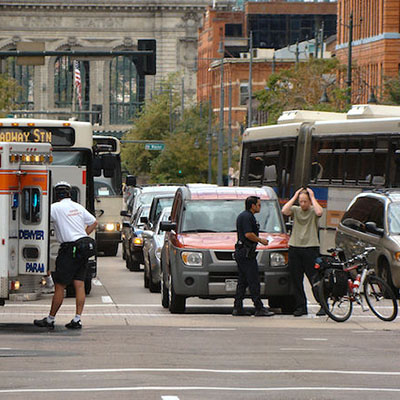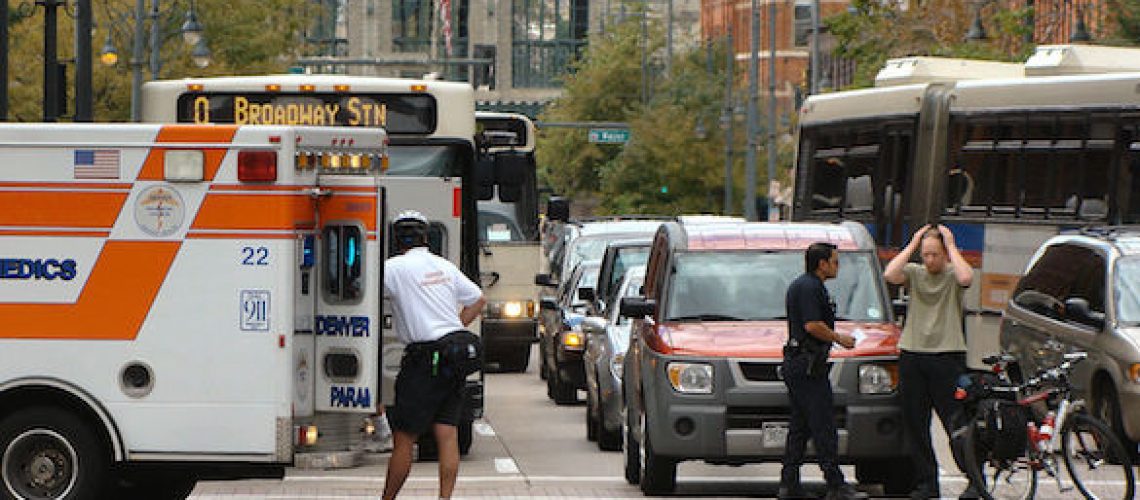Addressing the growing gap between Colorado’s transportation funding and its transportation needs
By Julie George, Director of Policy for LiveWell Colorado
Editors Note: This article originally appeared in the “New & Next” section of Confluence – Denver
 How will Colorado address transportation concerns in a way that serves citizens who get around by car, bike and foot?
How will Colorado address transportation concerns in a way that serves citizens who get around by car, bike and foot?
“We need to focus on moving people, not cars,” stated Speaker of the House Crisanta Duran (D-Denver) in her 2017 legislative session opening day remarks. Her words underscored the need to expand the scope of the debate on the future of transportation infrastructure funding to include walking, biking, and transit. These mobility improvements will be critical for solving Colorado’s transportation gridlock and sustaining Colorado’s economic growth.
There is a growing gap between Colorado’s transportation funding and its transportation needs, driven by increasing population and decreasing per capita transportation funds. The state gas tax has remained steady at 22 cents per gallon since 1991, the last time lawmakers raised it. Since then, 2.1 million people have moved to Colorado, and in 2015, drivers traveled 2.6 billion more miles than in 1991. While demands on transportation infrastructure have increased, 26 years of inflation combined with more fuel-efficient vehicles means the gas tax is now providing less revenue than before, a meager $68.94 per person in 2015, down from $125.70 in 1991.
To bridge this gap, the state needs an additional investment of $9 billion in highway infrastructure. Additional lane miles are only a small part of the answer—hundreds of thousands of Coloradans rely on transit services, bike paths, and sidewalks for transportation. A study conducted in August 2016 concluded there is a need for a $1 billion investment per year over the next 25 years to ensure that Coloradans have decent access to active transportation via walking, biking, and transit.
The economic benefits of mobility options extend beyond helping mitigate the loss of time and wasted fuel while sitting in traffic. Businesses as well as professionals who have recently relocated to Colorado cite the state’s support of “quality of life” investments, including opportunities to actively commute by biking and walking and easy access to trails and open spaces, as a reason for choosing Colorado.
Mobility investments are also critical for seniors, people with disabilities, and low-income Coloradans who may not be able to afford or operate a car. Weak or absent mobility options disconnect these Coloradans from good access to work, schools, and critical services, making it difficult to do the day-to-day activities that many take for granted.
LiveWell Colorado, along with many other stakeholders, was hopeful for a long-term solution with broad-based, bipartisan support of HB17-1242, sponsored by Duran and Senate President Kevin Grantham (R-Canon City) during this year’s session. The bill would have given the voters the option to raise the state’s sales tax to leverage $3.5 billion in infrastructure funding, including a newly-created fund to finance mobility options for both rural and urban Colorado. But conservative critics—opposed in principle to any form of tax increase—killed the bill in the Senate Finance Committee.
It is not clear what will happen next, but it is clear the need remains. LiveWell Colorado will continue working with the wide range of coalition members to find a transportation funding solution that includes dedicated dollars for walking, biking, and transit. Discussions are ongoing about whether to initiate a measure on the November 2017 ballot, wait until November 2018, or resume talks with legislative leadership to introduce a referred measure in the 2018 legislative session.
LiveWell strongly believes that in order for our transportation system to meet the needs of our growing population, including low income residents and seniors, funding for walking, biking, and transit must be prioritized to effectively fix Colorado’s transportation woes. We rely on Coloradans who are motivated to actively participate in increasing access to healthy eating and active living opportunities in their communities, and do our best to make it easy for anyone interested to influence public policies by providing background information, tools, and sample messaging to make a difference with just one or two minutes of your time. Visit our website to sign up for action alerts, policy updates, and other opportunities to engage your community leaders and support better access to healthy eating and active living for all Coloradans.

